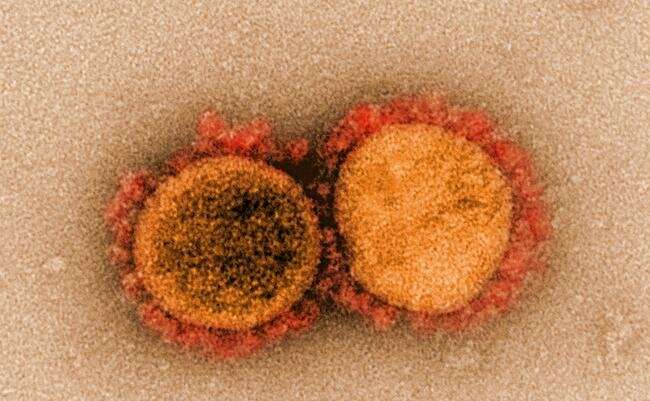Transmission electron micrograph of SARS-CoV-2 virus particles, isolated from a patient. Image captured and color-enhanced at the NIAID Integrated Research Facility (IRF) in Fort Detrick, Maryland. Credit: NIAID
A prospective study found that serial antigen testing could be an effective strategy to support infection control in nursing homes having a SARS-CoV-2 outbreak. While less sensitive than real-time reverse transcription-polymerase chain reaction (RT-PCR) diagnostic tests, the authors say that antigen tests perform well when it counts—when someone is infectious and at risk for spreading the virus. The findings are published in Annals of Internal Medicine.
Serial, facility-wide testing for SARS-CoV-2 can help identify cases in outbreak settings, allowing for rapid implementation of transmission-based precautions and infection prevention and control strategies. RT-PCR testing performed in a laboratory has the highest sensitivity, but its prolonged turnaround time can delay quarantine and isolation implementation. Antigen tests are easy to do and produce results in minutes, facilitating rapid action. However, performance data are lacking, especially in asymptomatic people.
Researchers from the Centers for Disease Control and Prevention (CDC) studied 532 specimens from 234 available residents and staff at a nursing home with a SARS-CoV-2 outbreak to evaluate the performance of antigen testing when used during an emerging outbreak. Two specimens were collected from all residents and staff 3 times over a 13-day period. Trained laboratory scientists tested one swab onsite using a rapid antigen test and the other was sent to the CDC for RT-PCR and virus culture reference testing. The researchers found that overall, the antigen test was less sensitive than RT-PCR, but it performed well in identifying early infections and specimens with replication-competent virus (that is, culture-positive). Further, consensus test analysis of individuals with a positive result and more than one test suggested that repeated testing produced similar positive agreement for antigen testing compared with RT-PCR, even in asymptomatic patients. According to the authors, these data suggest that early and frequent antigen testing during a SARS-CoV-2 outbreak may be an effective strategy for identifying infectious people with the greatest potential to transmit the virus.
More information: Study: https://www.acpjournals.org/doi/10.7326/M21-0422
Editorial: https://www.acpjournals.org/doi/10.7326/M21-1667
Journal information: Annals of Internal Medicine
Provided by American College of Physicians
























